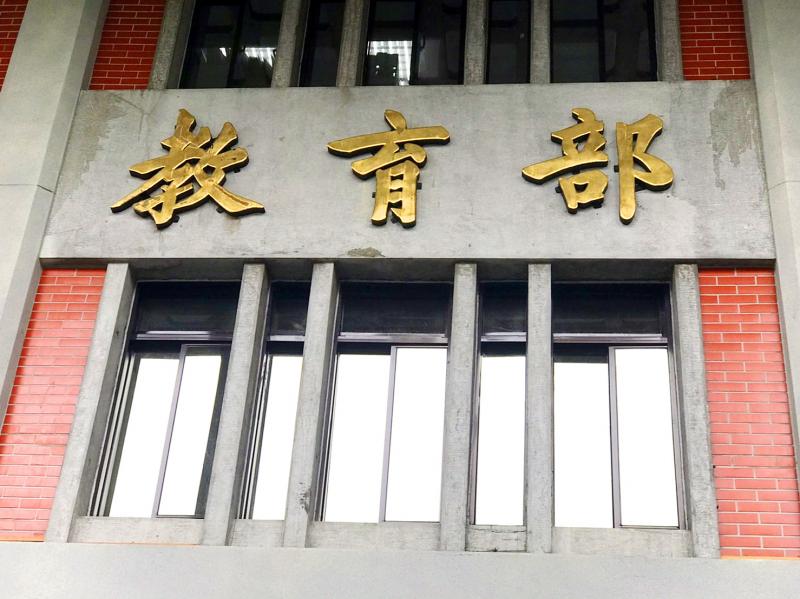The Ministry of Education (MOE) should investigate politicians whose education credentials have come under scrutiny to uphold the integrity of academia, Changhua County Councilor Huang Sheng-lu (黃盛祿) said on Thursday.
Huang’s comments followed allegations that Kaohsiung mayoral by-election candidate Jane Lee (李眉蓁) of the Chinese Nationalist Party (KMT) had plagiarized 96 percent of her master’s thesis.
Academia and politicians serve each other, as politicians need higher education to win greater support, while universities reap political and economic benefits from having alumni in politics, Huang said.

Photo: Rachel Lin, Taipei Times
Huang cited former KMT legislator Yu Yueh-hsia (游月霞) as an example, saying that she only had a vocational high school degree prior to serving as a lawmaker, and after her election, she earned a master’s degree in administrative management from National Changhua Normal University.
Union of Private School Educators president Yu Jung-hui (尤榮輝) said that Taiwan’s higher education system is showing signs of commercialization, especially in master’s degree courses offered to working people.
He said that the intent of the program — allowing people to pursue a degree while working — was good, but such programs run the risk of rubber-stamping academic degrees.
Universities are pandering to part-time students, lowering standards so they can more easily complete studies and obtain degrees, he said.
Working people have less time for studies or to write a thesis in addition to their full-time jobs, leading to the appearance of “essay mills,” where students turn in theses on topics that are incompatible with their subject of study or resorting to outright plagiarism, Yu Jung-hui said.
Schools need students and the students — who are often politicians, government officials and business executives — need the degree to “gold-plate” their credentials, he said.
Professors are prone to employ lax grading standards for these types of students, as politicians could expand their social network or provide economic benefits for their school or department, he said.
Yu Jung-hui said that these programs must institute tougher standards to prevent universities from helping to create fraudulent academic credentials and being seen as degree peddlers.
He added that the public and the ministry should address the deterioration of morals in higher education.
Over the past five years, there have been 17 incidents in which educational degrees have been revoked due to thesis plagiarism, the ministry said.
The university and professors should take responsibility for the issue, the ministry said, adding that how a university prevents incidents would be important when the ministry reviews universities’ applications for new colleges, student recruitment programs or government subsidies.
The ministry said that in the most extreme cases, it could refuse departments that have failed to institute measures to prevent plagiarism from applying for subsidies.
The ministry said that it is considering establishing a digital comparison system that would use the National Central Library’s archived theses database as a source, adding that the system could assist universities in identifying plagiarism.

An essay competition jointly organized by a local writing society and a publisher affiliated with the Chinese Communist Party (CCP) might have contravened the Act Governing Relations Between the People of the Taiwan Area and the Mainland Area (臺灣地區與大陸地區人民關係條例), the Mainland Affairs Council (MAC) said on Thursday. “In this case, the partner organization is clearly an agency under the CCP’s Fujian Provincial Committee,” MAC Deputy Minister and spokesperson Liang Wen-chieh (梁文傑) said at a news briefing in Taipei. “It also involves bringing Taiwanese students to China with all-expenses-paid arrangements to attend award ceremonies and camps,” Liang said. Those two “characteristics” are typically sufficient

A magnitude 5.9 earthquake that struck about 33km off the coast of Hualien City was the "main shock" in a series of quakes in the area, with aftershocks expected over the next three days, the Central Weather Administration (CWA) said yesterday. Prior to the magnitude 5.9 quake shaking most of Taiwan at 6:53pm yesterday, six other earthquakes stronger than a magnitude of 4, starting with a magnitude 5.5 quake at 6:09pm, occurred in the area. CWA Seismological Center Director Wu Chien-fu (吳健富) confirmed that the quakes were all part of the same series and that the magnitude 5.5 temblor was

The brilliant blue waters, thick foliage and bucolic atmosphere on this seemingly idyllic archipelago deep in the Pacific Ocean belie the key role it now plays in a titanic geopolitical struggle. Palau is again on the front line as China, and the US and its allies prepare their forces in an intensifying contest for control over the Asia-Pacific region. The democratic nation of just 17,000 people hosts US-controlled airstrips and soon-to-be-completed radar installations that the US military describes as “critical” to monitoring vast swathes of water and airspace. It is also a key piece of the second island chain, a string of

The Central Weather Administration has issued a heat alert for southeastern Taiwan, warning of temperatures as high as 36°C today, while alerting some coastal areas of strong winds later in the day. Kaohsiung’s Neimen District (內門) and Pingtung County’s Neipu Township (內埔) are under an orange heat alert, which warns of temperatures as high as 36°C for three consecutive days, the CWA said, citing southwest winds. The heat would also extend to Tainan’s Nansi (楠西) and Yujing (玉井) districts, as well as Pingtung’s Gaoshu (高樹), Yanpu (鹽埔) and Majia (瑪家) townships, it said, forecasting highs of up to 36°C in those areas